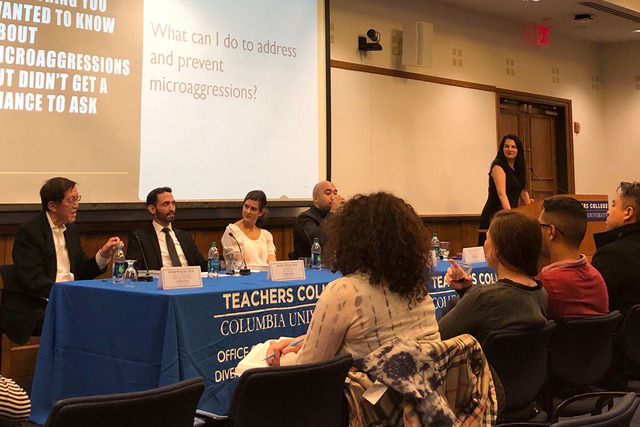This section of the SUNY Empire website is no longer being updated.
View current SUNY Empire Stories.
November 19, 2018
A New Book on "Microaggressions” Explores the Impact of Denigrating Messages About Race, Gender, Religion, Sexual Orientation and Many Others
“Microaggression Theory: Influence and Implications,” Builds on Previous Scholarship

More than 65 people turned out for a panel discussion on “Microaggression Theory: Influence and Implications,” a new book co-edited by SUNY Empire State College Associate Professor and Chair of the Department of Psychology and Human Development Gina Torino.
“The book highlights how microaggressions can manifest themselves in a variety of contexts, including health care, within the workplace and even online,” said Torino. “The book also provides interventions readers could use at their places of work, at school – or wherever they are – to help mitigate the harmful effects of microaggressions in the future.”
As the book states, “Microaggressions are brief, everyday exchanges that send denigrating messages to certain individuals because of their group membership (e.g., race, gender, culture, religion, social class, sexual orientation, etc.).”
Exploring these microaggressions in their sociopolitical context, the book looks at the psychology behind these exchanges that leave many people feeling vulnerable, targeted, angry and afraid.
A lively question and answer session followed the panel presentation of the book.
According to Torino, questions, including, “What is fear and its relationship to microaggression?”
explored the topic of microaggression in depth.
Another question from the audience led to a discussion of the “snowflake generation,” younger millennials who see themselves as unique individuals and insist on being treated equally.
Torino said that examples of behavioral and verbal microaggression include assumptions on criminality, like being followed while shopping in a retail story because of the color of your skin, or being told that “You speak great English,” because someone is perceived to be a foreigner, when, in fact, they are a citizen of the U.S.
“Those small things occur frequently,” said Torino. “There is a cumulative long-term impact from the frequency of microaggression on many people.”
Torino also discussed the attributional ambiguity of microaggression, a topic also touched on in the Q&A session: “Let’s say you’re a black person and you’re at your workplace and you’re in the lunch room and nobody’s sitting next to you. ‘Why isn’t anybody sitting next to you? Is it because you’re new, is it because everyone else in the room is white and they don’t want to sit next to you because you’re black? How do I attribute this behavior?’ Sometimes you don’t know. It’s the ambiguity of the microaggression, which makes them so difficult and potentially harmful.”
Torino’s colleagues and co-editors of microaggression theory are Associate Professor of Psychology at CUNY Queens College David P. Rivera; Adjunct Associate Professor Christina M. Capodilupo, Teachers College, Columbia University; Professor of Psychology Kevin L. Nadal, at CUNY John Jay College of Criminal Justice CUNY’s Graduate Center; and Professor of Psychology and Education Derald Wing Sue, Department of Counseling and Clinical Psychology at Teachers College, Columbia University.
According to Torino, the book builds on research she and others, including her then doctoral thesis advisor Sue, and fellow students Capodilupo and Nadal, conducted.
Published in 2007, “Racial Microaggressions in Everyday Life: Implications for Clinical Practice,” now has more than 3,000 citations, a significant contribution, which Torino said has led to a substantial increase in research of the field.
The term microaggression was first coined by the late psychiatrist Chester Pierce, a professor of education and psychiatry at Harvard University Medical School, in the 1970s.
Then, in 2017, microaggression was adopted by Merriam-Webster.
The event was held Wednesday, Nov. 7, at Teachers College, Columbia University.